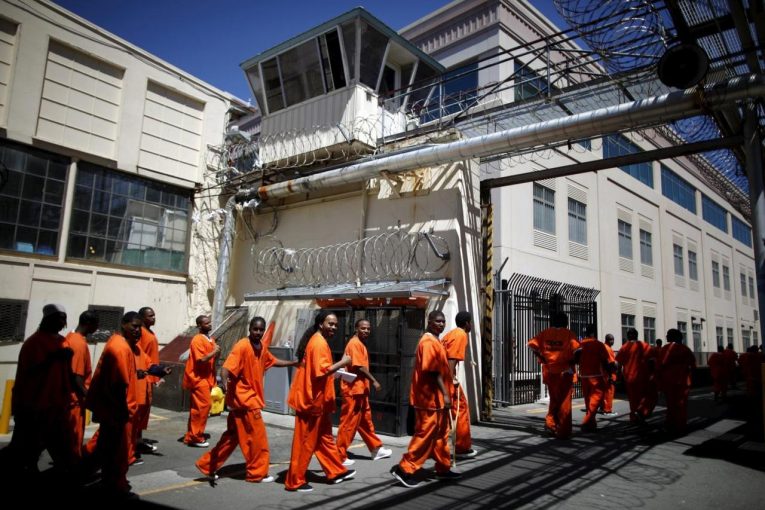

By Taric Mansour
Incarcerated people in San Quentin are searching for answers, as overcrowding and poor operating conditions continue to increase the risk of contracting the coronavirus. In response to these concerns, Dr. Sears of the Department of Medicine says that decarceration is a necessary solution.
On Wednesday, California State Senate discussed the state of coronavirus in California State Prisons.
Susan Fanelli, Chief Deputy for Policy and Programs for the Department of Health explained that cases are rapidly increasing, especially in overcrowded prisons where social distancing is physically impossible.
Fanelli noted that last month there were over 220,000 new cases with a 2.9% increase over the last 24 hours. Following general health guidelines is essential to preventing the virus from spreading, said Fanelli, adding that prisons must screen everyone who visits the prison, enforce social distancing orders, cancel all non-essential gatherings, quarantine exposed prisoners, exclude exposed staff, and continue to enforce that masks be worn on the prison grounds.
Given the overcrowding nature of some California Prisons, many of these guidelines are nearly impossible to follow.
San Quentin prison situation has been at the epicenter of the California prison system’s outbreak.
Clark Kelso, a Federal Receiver for CCHS stated that San Quentin Prison is severely understaffed, and the facility lacks proper ventilation in cell blocks which allows the virus to spread rapidly. Furthermore, the layout of San Quentin is detrimental to the prisoner’s heath because it is relatively compacted. Currently, there are over 1,000 prisoners who have tested positive for coronavirus in San Quentin.
Furthermore, the layout of San Quentin is detrimental to the prisoner’s heath because it is relatively compacted. Currently, there are over 1,000 prisoners who have tested positive for coronavirus in San Quentin.
Some prisoners are refusing to be tested, while others that do get tested are not receiving their results in time. Clark Kelso mentioned that tents and field hospitals are being delivered to San Quentin to ease the social distancing concerns.
Senator Holly Mithcell expressed concern about the State’s reluctance to release prisoners given San Quentin’s inability to maintain social distancing protocols.
Clark Kelso was asked whether or not he had the authority to require releases due to overcrowding in prisons, but Kelso stated that he does not have the authority to order housing changes or releases.
Secretary Ralph Diaz, who was appointed in 2019 as the Secretary for the California Department of Corrections and Rehabilitation was asked a follow-up question with regards to the health and safety of the staff members in California State prisons. Senator Diaz had no direct solution but added that there is a difficulty with obtaining the necessary contracts to test all the staff members.
Sam Lewis of the Anti-Recidivism Coalition said that while he was, incarcerated he received very poor medical attention, and would get sick often even before the coronavirus came into play. Lewis brought attention to Lancaster state prison, where new cases have stopped completely, in part due to their cooperation with social distancing orders.
Lewis expressed his concerns regarding the state of San Quentin prison, noting that the conditions are putting prisoners at serious risk of death.
Dr. Sears from the Department of proposed a 3-part strategy to address concerns that these prisoners are facing. Dr. Sears.
The first step is to develop a centralized COVID 19 outbreak emergency response team that can optimize ventilation, sanitization, and patient flow in the prison. This would include healthcare workers, epidemiologists, and a unit for COVID testing.
Secondly, Dr. Sears proposes immediate decarceration in San Quinten prison to address the issue of overcrowding, providing that the number of prisoners in San Quentin needs to be reduced by 50%.
This would allow San Quentin to follow social distancing protocols, and prevent the spread of COVID-19. Third, Sears claims that prisons must immediately develop a plan to effectively test and protect facility and staff, and they are at extremely high risk.
Senator Mitchell agreed with Dr. Sears’s sentiments, and Secretary Ralph Diaz claimed that efforts will be made to combat the social distancing concerns.
However, for San Quentin prisoners, officials suggested that decarceration seems unlikely given the fact that there is no plan currently in place to decide what prisoners get released, and where they end up upon release.
Diaz emphasized public safety concerns that would follow a mass decarceration release, including an increase in crime rate and potential coronavirus spreading.
The California Senate will hold future hearings to resolve this issue, with the proposed mass decarceration admittedly a long-shot, despite the plan proposed by Dr. Sears.
To sign up for our new newsletter – Everyday Injustice – https://tinyurl.com/yyultcf9
